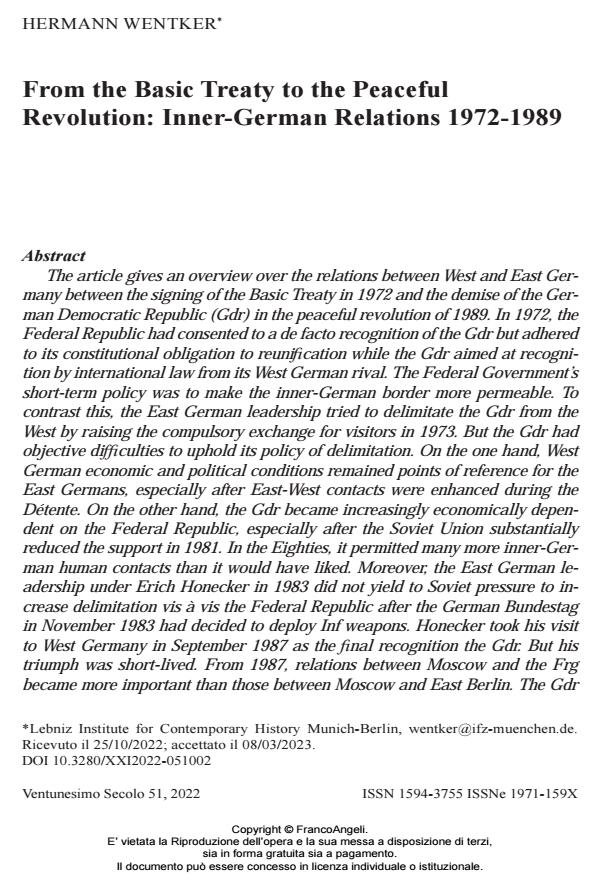From the Basic Treaty to the Peaceful. Revolution: Inner-German Relations 1972-1989
Journal title VENTUNESIMO SECOLO
Author/s Hermann Wentker
Publishing Year 2023 Issue 2022/51 Language English
Pages 15 P. 9-23 File size 117 KB
DOI 10.3280/XXI2022-051002
DOI is like a bar code for intellectual property: to have more infomation
click here
Below, you can see the article first page
If you want to buy this article in PDF format, you can do it, following the instructions to buy download credits

FrancoAngeli is member of Publishers International Linking Association, Inc (PILA), a not-for-profit association which run the CrossRef service enabling links to and from online scholarly content.
The article gives an overview over the relations between West and East Ger- many between the signing of the Basic Treaty in 1972 and the demise of the German Democratic Republic (Gdr) in the peaceful revolution of 1989. In 1972, the Federal Republic had consented to a de facto recognition of the Gdr but adhered to its constitutional obligation to reunification while the Gdr aimed at recogni- tion by international law from its West German rival. The Federal Government’s short-term policy was to make the inner-German border more permeable. To contrast this, the East German leadership tried to delimitate the Gdr from the West by raising the compulsory exchange for visitors in 1973. But the Gdr had objective di?culties to uphold its policy of delimitation. On the one hand, West German economic and political conditions remained points of reference for the East Germans, especially after East-West contacts were enhanced during the Détente. On the other hand, the Gdr became increasingly economically depen- dent on the Federal Republic, especially after the Soviet Union substantially reduced the support in 1981. In the Eighties, it permitted many more inner-Ger- man human contacts than it would have liked. Moreover, the East German le- adership under Erich Honecker in 1983 did not yield to Soviet pressure to in- crease delimitation vis à vis the Federal Republic after the German Bundestag in November 1983 had decided to deploy Inf weapons. Honecker took his visit to West Germany in September 1987 as the final recognition the Gdr. But his triumph was short-lived. From 1987, relations between Moscow and the Frg became more important than those between Moscow and East Berlin. The Gdr was threatened by isolation. In the end it was the Gdr’s weakness with regard to economic power, its unwanted political system and the unsolved German question, which led to its defeat in the contest with the Federal Republic.�
Keywords: Détente; Basic Treaty; inner-German relations; reunification of Germany; delimitation.
Hermann Wentker, From the Basic Treaty to the Peaceful. Revolution: Inner-German Relations 1972-1989 in "VENTUNESIMO SECOLO" 51/2022, pp 9-23, DOI: 10.3280/XXI2022-051002